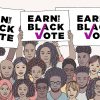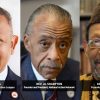
In the late 1790s, Richard Allen and former enslaved people in Philadelphia were tired of praying in the upper regions of St. George’s Methodist Episcopal Church and came down to the altar. When they were summarily removed from their prayerful positions, they came together to birth the African Methodist Episcopal Church—the nation’s first of its kind. More than 200 years later, the Connectional AME Church spans the globe on five continents.
Over the years, the black church has been the meeting place to organize, strategize and pray for true liberation for black and other marginalized people in America. During this time, the black church universally, and AME churches in particular, have been attacked by domestic terrorists to send a ripple throughout the black community—not only locally but also globally.
I grew up at Bethel African Methodist Episcopal Church in Ann Arbor, Mich. I met lifelong friends in that church and in the youth organization in which I participated. I honed my speaking and leadership skills while participating in youth organizations on local, state and district levels.
My home church rests down the street from a safe house that was used during the Underground Railroad. The state of South Carolina has more AME churches than the district in which I grew up—the 4th Episcopal District—which spans the area from Chicago to Toronto.
The terrorist actions that occurred last night at Emanuel AME Church in Charleston, S.C.—which claimed the lives of nine people, including its pastor, the Rev. Clementa C. Pinckney—are horrifying but also a continuation of attacks upon black churches that have occurred throughout the history of this nation. The story of the modern civil rights movement cannot be told without discussing the attacks on black houses of worship.
Black pastors, ministers and their families were under constant attack as they led their communities and congregants to work and pray for a better life in this nation. Even though federal legislation to unlock barriers to public accommodations, employment and the vote were enacted, the attacks on houses of worship have continued.
As recently as a couple of years ago, a college classmate had his AME church burned in South Carolina. As Conor Friedersdorf of The Atlantic wrote today, the FBI identified 3,563 victims of racially motivated hate crimes in 2013, of whom two-thirds were black.
The history of Charleston’s Mother Emanuel AME Church is riddled with acts of violence upon it. Nevertheless, as it has done throughout its 200-year history, and as many black churches before it have done, this church shall rise again.
Even though the suspect in the shooting, Dylann Storm Roof, has been captured, questions remain: How will the people of Mother Emanuel and those who came to learn more about God’s word carry on? Who will continue Pinckney’s work in the state Senate this fall? And will the battle to eradicate racial terrorism in America begin?
“God of our weary years,/God of our silent tears,/Thou who has brought us thus far on the way;/Thou who has by thy might,/Led us into the light,/Keep us forever in the path, we pray.” —“Lift Ev’ry Voice and Sing,” James Weldon Johnson
Khyla D. Craine is a civil rights attorney and activist. Follow her on Twitter.














